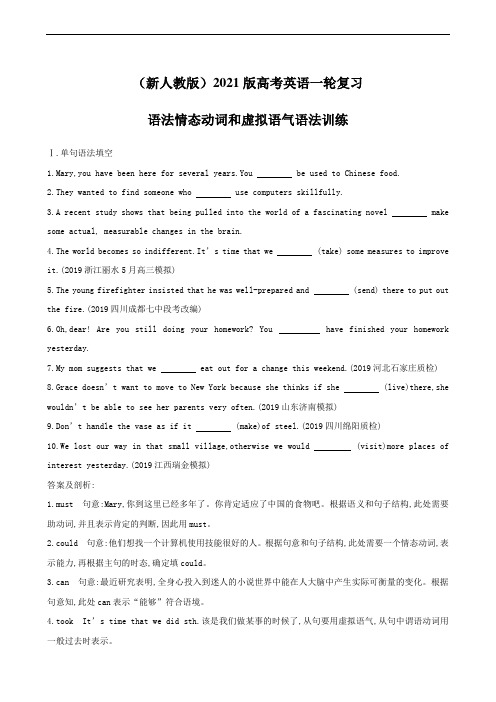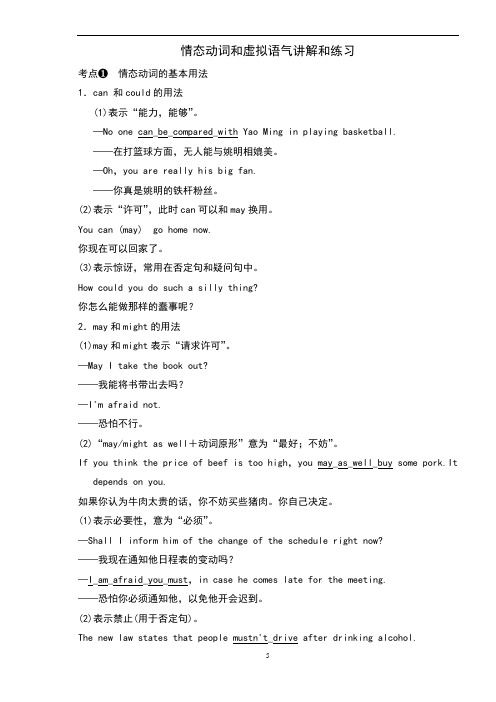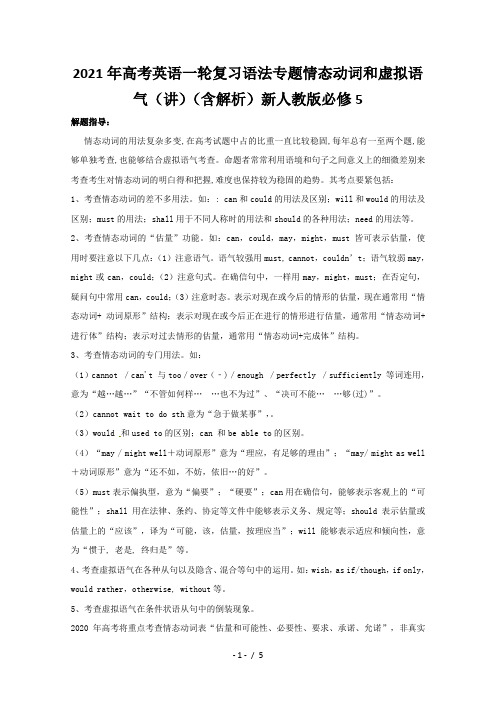高考英语一轮复习 语法专题 第九讲 情态动词和虚拟语气 新人教版
- 格式:doc
- 大小:75.01 KB
- 文档页数:11

(新人教版)2021版高考英语一轮复习语法情态动词和虚拟语气语法训练Ⅰ.单句语法填空1.Mary,you have been here for several years.You be used to Chinese food.2.They wanted to find someone who use computers skillfully.3.A recent study shows that being pulled into the world of a fascinating novel make some actual, measurable changes in the brain.4.The world becomes so indifferent.It’s time that we (take) some measures to improve it.(2019浙江丽水5月高三模拟)5.The young firefighter insisted that he was well-prepared and (send) there to put out the fire.(2019四川成都七中段考改编)6.Oh,dear! Are you still doing your homework? You have finished your homework yesterday.7.My mom suggests that we eat out for a change this weekend.(2019河北石家庄质检)8.Grace doesn’t want to move to New York because she thinks if she (live)there,she wouldn’t be able to see her parents very often.(2019山东济南模拟)9.Don’t handle the vase as if it (make)of steel.(2019四川绵阳质检)10.We lost our way in that small village,otherwise we would (visit)more places of interest yesterday.(2019江西瑞金模拟)答案及剖析:1.must 句意:Mary,你到这里已经多年了。

情态动词和虚拟语气讲解和练习考点❶情态动词的基本用法1.can 和could的用法(1)表示“能力,能够”。
—No one can_be_compared_with Yao Ming in playing basketball.——在打篮球方面,无人能与姚明相媲美。
—Oh,you are really his big fan.——你真是姚明的铁杆粉丝。
(2)表示“许可”,此时can可以和may换用。
You can (may) go home now.你现在可以回家了。
(3)表示惊讶,常用在否定句和疑问句中。
How could you do such a silly thing?你怎么能做那样的蠢事呢?2.may和might的用法(1)may和might表示“请求许可”。
—May I take the book out?——我能将书带出去吗?—I'm afraid not.——恐怕不行。
(2)“may/might as well+动词原形”意为“最好;不妨”。
If you think the price of beef is too high,you may_as_well_buy some pork.It depends on you.如果你认为牛肉太贵的话,你不妨买些猪肉。
你自己决定。
(1)表示必要性,意为“必须”。
—Shall I inform him of the change of the schedule right now?——我现在通知他日程表的变动吗?—I_am_afraid_you_must,in case he comes late for the meeting.——恐怕你必须通知他,以免他开会迟到。
(2)表示禁止(用于否定句)。
The new law states that people mustn't_drive after drinking alcohol.新颁布的法律禁止人们酒后驾车。

2021年高考英语一轮复习语法专题情态动词和虚拟语气(讲)(含解析)新人教版必修5解题指导:情态动词的用法复杂多变,在高考试题中占的比重一直比较稳固,每年总有一至两个题,能够单独考查,也能够结合虚拟语气考查。
命题者常常利用语境和句子之间意义上的细微差别来考查考生对情态动词的明白得和把握,难度也保持较为稳固的趋势。
其考点要紧包括:1、考查情态动词的差不多用法。
如:: can和could的用法及区别;will和would的用法及区别;must的用法;shall用于不同人称时的用法和should的各种用法;need的用法等。
2、考查情态动词的“估量”功能。
如:can,could,may,might,must 皆可表示估量,使用时要注意以下几点:(1)注意语气。
语气较强用must, cannot,couldn’t;语气较弱may,might或can,could;(2)注意句式。
在确信句中,一样用may,might,must;在否定句,疑问句中常用can,could;(3)注意时态。
表示对现在或今后的情形的估量,现在通常用“情态动词+ 动词原形”结构;表示对现在或今后正在进行的情形进行估量,通常用“情态动词+进行体”结构;表示对过去情形的估量,通常用“情态动词+完成体”结构。
3、考查情态动词的专门用法。
如:(1)cannot /can't 与too/over(‐)/enough /perfectly /sufficiently 等词连用,意为“越…越…”“不管如何样……也不为过”、“决可不能……够(过)”。
(2)cannot wait to do sth意为“急于做某事”,。
(3)would 和used to的区别;can 和be able to的区别。
(4)“may / might well+动词原形”意为“理应,有足够的理由”;“may/ might as well +动词原形”意为“还不如,不妨,依旧…的好”。



2021年高考英语一轮复习语法专题情态动词和虚拟语气(讲)(含解析)新人教版必修4情态动词差不多用法:(1)can和could①can的用法:a.表示体力和脑力方面的能力。
b.表示对现在的动作或状态进行主观的推测,要紧用在否定句和疑问句中。
c.表示可能性,理论上的可能性,意为“有时候可能会”,可用于确信句。
d.表示承诺,意思与may接近。
e.表示说话人的估量、怀疑、惊奇、推测或不确信等,要紧用于否定句、疑问句或感叹句中。
f. can的专门句型:cannot…too / enough 表示“不管如何……也只是分”。
“越……越好”。
cannot but+ do sth. 表示“不得不,只好”。
②could的用法:a.表示能力,指的是过去时刻。
b.表示承诺,指的是过去时刻。
c.表示可能,能够指过去时刻,也能够指现在时刻,表示语气缓和。
d.委婉客气地提出问题或陈述看法,指的是现在时刻。
要紧用于疑问句,回答时用can。
③can与could的区别:can表估量时只用于否定句和疑问句(could无此限制)。
couldn’t 的可能性比can’t小。
④can与be able to的区别:a.现在时:无区别,但后者不常用。
b.完成时;can没有完成时,现在要用have(has, had)been able to。
c.今后时:can没有今后时,要用will be able to。
d.过去时:could表示一样能力,was/were able to 表示在具体场合通过努力成功做成某事的能力。
(2)may 和might①may的用法:a.表示询问或说明一件事可不能够做。
b.表示一件事或许会发生或某种情形可能会存在,通常用在确信句和否定句中。
注意:表示可能性时,can’t语气强,表示“不可能”,may not语气弱,表示“可能不”。
②might的用法:a.表示询问或承诺,指的是过去时刻。
b.表示可能发生的事,能够指过去时刻,也能够指现在时刻,语气更加不确信,可能性比may小一些。
第九讲情态动词与虚拟语气情态动词(一)1.can/could(1)表示能力,意为“能,会”。
The smallest good habits can make a big difference.最小的好习惯会产生很大的作用。
It was several minutes before I could take in what he was saying.过了好几分钟,我才理解他说的是什么。
(2)表示推测,意为“可能”,用于否定或疑问句中。
can比could语气强。
This can’t/couldn’t be done by him.这事不可能是他干的。
(3)表示请求或允许。
在疑问句中可以用could代替can,语气更委婉。
Could I use your phone, please?我可以用一下你的电话吗?(4)表示理论上的可能性。
Always believe that good things are possible, and remember that mistakes can be lessons that lead to discoveries.要始终相信美好事物的降临并非不可能,失误也会变成经验教训,从而获得更多发现。
(5)用于否定句和疑问句,表示惊异、怀疑、不相信等态度。
He can’t/couldn’t do this.他不可能这样干。
(表示不相信)Can this be done by him?这可能是他干的吗?(表示疑惑、惊讶)(6)用于固定结构中①can’t ... too/enough表示“无论……也不过分;越……越好”。
You can’t be too careful while driving.你开车时越小心越好。
②can’t help doing sth.表示“禁不住做某事”。
Hearing this story, I couldn’t help laughing.听到这个故事,我禁不住大笑起来。
情态动词重点难点解析情态动词的高考命题导向:情态动词表示说话者的情感和态度,有一定的含义,但是不能单独做谓语,必须与其他动词连用。
注意区别具有相同功能的,意思相近的情态动词的用法。
二“情态动词+进行式”和“情态动词+完成式”用法一览表填入情态动词的恰当形式或根据括号所提供的词填入情态动词恰当的结构。
1. I should have been there, but I ____________ find the time.2. Helen _______ go on the trip with us, but she isn’t quite sure yet.3. Tom, you ___________ not leave all your clothes on the floor like this!4. You can’t imagine that a well behaved gentleman _____________ be so rude to a lady.5. It has been announced that candidates_____________ remain in their seats until all thepapers have been collected.6. ---Lucy doesn’t mind lending you her dictionary.---She ____________. I’ve already borrowed one.7. John, look at the time. _______________ you play the piano at such a late hour?8. ---__________ this book be yours?---No, it ____________ not be mine. It ___________ be his.9.As a girl, she ____________ get up at six every day.10.__________ he to clean the classroom after school?11.You ____________ be tired after the long trip, aren’t you?12.---What’s the name?---Khulaifi. __________ I spell that for you?13.You _____________________ (see) the film, haven’t you?14.You _____________________ (talk) on the phone at that time, for I couldn’t get through.15.They _____________________ (miss) the plane, or perhaps they have been prevented fromcoming for some reason.16.______________ you pass the college entrance examinations!17.He had known the matter before you told him, so you _________________ (not tell) it to him.虚拟语气重点难点解析虚拟语气的高考命题导向:虚拟语气表示说话人的愿望、假设、猜测或建议,而不是表示客观存在的事实。
第九讲情态动词和虚拟语气一、情态动词考点透析1.can (could),be able to。
can只有现在式can和过去式could两种形式, be able to可用于现在式、过去式、将来时、完成时。
要表示“能够做某事”,可用can或be able to,但若要说过去的确运用了某种能力做成了某件事情,就只能用was/were able to,表将来具备的能力只能用will/shall be able to。
(1)If you study hard,you will be able to express freely in English in three months.如果你努力学习,三个月后你就能自由地用英语表达了。
(2)The fire spread through the hotel very quickly but everyone was able to get out.大火迅速在酒店蔓延,但每个人最终还是逃出去了。
2.could是can的过去式,但是在很多情况下,特别是在口语中,它表示语气的委婉。
因此,用could提问时,不能用could回答,而要用can或may。
would,might用于疑问句时也表委婉语气,回答时应该用will,may。
(1)-Could I borrow your dictionary?——能借用一下你的词典吗?-Yes,of course you can.——可以,当然可以。
(2)-Could I call you by the first name?——我可以直呼你的名字吗?-Yes,you may.——行,可以的。
(3)-Would you be so kind as to explain the word?——请你好心地解释一下这个字好吗?-Yes,I will.What is it?——好的,哪个字?3.may/might,can/could都可表示可能,但may/might 不能用于问句,can/could用于否定句、疑问句、感叹句,表示惊异、怀疑,一般不用于肯定句。
如果用于肯定句,则表示偶尔发生某事的可能,或某人某物一时的特点。
(1)-Are you coming to Jeff's party?——你会来参加杰佛的晚会吗?-I'm not sure.I might go to the concert instead.——说不好,我可能会去音乐会。
(2)-Where can Mr.Li be?——李先生会在哪里呢?-Sorry,I don't know.You can go to ask Mr.Zhang.He may help you.——对不起,我不知道。
你可以去问问张先生,他可能会帮到你。
(3)Mr.Bush is on time for everything.How can it be that he was late for the opening ceremony?布什先生做什么都准时,开幕式时他怎么就迟到了呢?(4)We enjoy good weather in January,but sometimes it can be terribly cold.我们这儿一月份天气都很好,但是偶尔也会很冷的。
4.must表推测用于肯定句,其否定式要用can't。
对现在表示推测:must do;can't do对正在进行的动作表示推测:must be doing;can't be doing对过去表示推测:must have done;can't/couldn't have done(1)-There were already five people in the car,but they managed to take me as well.——车里已经有五人了,但他们还是设法带上了我。
-It couldn't have been a comfortable journey.——那就不可能是舒适的旅途了。
(2)Jack can't have arrived yet,otherwise he would have telephoned me.杰克不可能已经到了,否则他会给我电话的。
(3)Put on more clothes,you must be feeling cold with only a shirt on.多穿点衣服,只穿一件衬衣,你一定觉得冷吧。
(4)I didn't hear the phone.I must have been asleep.我没有听到电话响,我一定是睡着了。
5.情态动词完成式的意义。
can/could have done过去可能做过,过去本来可以做某事但没有做must have done过去一定做过may have done可能已经做过,本来可以做但没做might have done过去可能做过,过去本来可以做但没做can't/couldn't have done过去不可能做过某事should (not) have done过去本该(不该)做,但却没做(做了)ought (not) to have done过去本该(不该)做,但却没做(做了)needn't have done过去本来没必要做,但却做了would rather (not) have done宁愿过去做了(没做)注意:must have done,may have done,might have done,can't have done都表推测。
其区别在于可能性的大小。
must have done表很有可能,may have done表有可能,might have done表可能性很小,can't have done则为“不可能”。
(1)I told Sally how to get here,but perhaps I should have written it out for her.我告诉过莎莉怎么来这儿,不过也许我该写给她的。
(2)Sorry,I'm late.I might have turned off the alarm clock and gone back to sleep again.对不起,我迟到了。
我可能关掉闹钟又睡着了。
(3)I was really anxious about you.You shouldn't have left home without a word.我真为你担心,你不该什么也不说就离家出走的。
(4)Tom needn't have got up that early since it was Sunday and he had nothing important to do.汤姆本来没有必要起那么早的,因为是星期天,他也没什么重要事情。
(5)I would rather not have blamed him because he was a child after all.我宁愿没有责备他。
因为他毕竟只是个孩子。
6.关于should的主要用法。
(1)It's already seven o'clock.Jack should be here at any moment.已经七点钟了,杰克随时都可能来的。
(should表推测,意为“随时都会来”,“真该来了”)(2)-When can I come for the photos? I need them tomorrow afternoon.——我什么时候来拿照片?我明天下午要用。
-They should be ready by 12:00.(should:应该)——十二点前应该就可以了。
(3)You can't imagine that a wellbehaved gentleman should be so rude to a lady.你难以想象一个举止优雅的绅士对女士居然这么粗鲁。
(should表惊异,意为“居然”、“竟然”)(4)If he should fail to come,ask Mr.Zhang to attend the ceremony instead.要是他万一来不成,就叫张先生代替出席这个典礼吧。
(should表语气较强的假设,意为“万一”)(5)We should have studied last night,but we went to the concert instead.(should have studied:我们本该学习的,但却没有学习)我们昨晚本该学习的,但是我们却去了音乐会。
7.关于shall的用法。
shall用于第一人称、第三人称疑问句中,表示说话人征求对方意见或向对方请示。
shall用于第二、第三人称,表示说话人给对方的命令、警告、允诺或威胁。
(1)Shall I go on reading the text?我要继续读课文吗?(shall:征求意见)(2)You shall be punished one day for what you've done.总有一天你会因你的所作所为受到惩罚的。
(shall:威胁,警告)(3)He shall get what he deserves.I promise it.他会得到他应该得到的,我保证。
(shall:允诺)强化训练一按照句子结构的语法性和句子连贯的要求,在空白处填上适当的情态动词或根据提示使用正确形式的情态动词。
1.I ________ (not) use a clock to wake me up because at six o'clock each morning the train comes by my house.2.I________ (not) thank you too much for all your help to my son while we were away from home.3.—________ you interrupt now? Can't you see I'm on the phone?—Sorry Sir, but it's urgent.4.I got close enough to hear them speaking Chinese, and I said “Ni Hao” just as I ________do in China.5.We ________ (not) have bought so much food now that Suzie won't be with us for dinner.6.One of our rules is that every student________wear school uniform while at school.7.I'm going to Europe on vacation together with John if I ________ find the money.8.—You have to believe in yourself.No one else will, if you don't.—I ________ (not) agree more.Confidence is really important.9.The new law states that people ______(not) drive after drinking alcohol.10.It's quite warm here; we ________(no t) turn the heating on yet.11.—No one ________ be compared with Yao Ming in playing basketball.—Oh, you are really his big fan.12.The police still haven't found the lost child, but they're doing all they ________.13.It ________ (not) be the postman at the door.It's only six o'clock.14.—How's your new babysitter?—We ________ (not) ask for a better one.All our kids love her so much.15.—I don't really like James.Why did you invite him?—Don't worry.He ________ not come.He said he wasn't certain what his plans were.16.If you ________ smoke, please go outside.17.If you ______ go, at least wait until the storm is over.18.—Shall I inform him of the change of the schedule right now?—I am afraid you ________, in case he comes late for the meeting.19.I ________ (not) worry about my weekend.I always have my plans ready before it comes.20.—Will you read me a story, Mummy?—OK.You________ have one if you go to bed as soon as possible.答案:1.needn't 2.can't 3.Must 4.might 5.needn't6.shall 7.can 8.couldn't/can't 9.mustn't 10.needn't 11.can 12.can 13.can't14.couldn't15.might16.must17.must18.must19.needn't20.shall二、虚拟语气考点透析1.虚拟语气在非真实条件句中的用法。